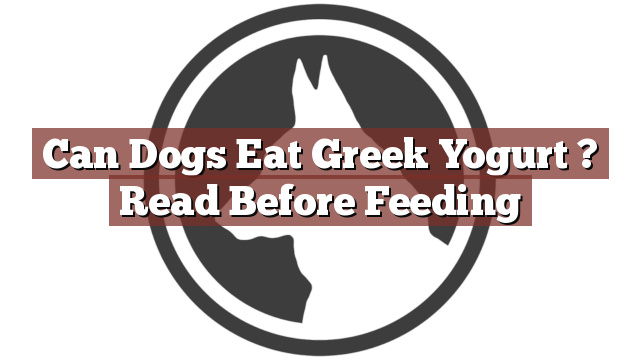Understanding Your Dog’s Dietary Needs
As a responsible dog owner, it is crucial to understand your furry friend’s dietary needs. While dogs are primarily carnivores, they can benefit from certain fruits, vegetables, and dairy products in moderation. However, it is important to be cautious and informed about what foods are safe and suitable for your canine companion. One frequently asked question among dog owners is, can dogs eat Greek yogurt? Let’s delve into this query and explore the potential benefits and drawbacks of feeding Greek yogurt to dogs.
Can Dogs Eat Greek Yogurt? Read Before Feeding
Can dogs eat Greek yogurt? The answer is yes, but with some caveats. Greek yogurt can be a healthy addition to your dog’s diet when given in moderation. It is a great source of protein, calcium, and probiotics, which can aid in digestion and promote a healthy gut. However, it is vital to remember that not all dogs can tolerate dairy products, especially those with lactose intolerance or sensitivities. Therefore, it is crucial to observe your dog’s reaction to Greek yogurt and consult with a veterinarian before introducing it as a regular part of their diet.
Pros and Cons of Feeding Greek Yogurt to Dogs
Feeding Greek yogurt to dogs can have both advantages and disadvantages. One of the primary benefits is the high protein content, which helps in muscle growth and repair. Additionally, Greek yogurt contains calcium, which contributes to strong bones and teeth. The probiotics found in Greek yogurt can improve digestion and support a healthy immune system in dogs. However, it is essential to be mindful of the potential drawbacks. Dogs with dairy sensitivities may experience gastrointestinal upset, such as diarrhea or gas, when consuming Greek yogurt. Moreover, some flavored Greek yogurts may contain artificial sweeteners like xylitol, which is highly toxic to dogs. Always opt for plain, unsweetened Greek yogurt when considering it as a treat for your furry friend.
Conclusion: Proceed with Caution when Feeding Greek Yogurt to Dogs
In conclusion, Greek yogurt can be a nutritious addition to your dog’s diet if introduced properly and in moderation. However, it is crucial to be aware of your dog’s specific dietary needs and any potential sensitivities they may have. Always consult with a veterinarian before including Greek yogurt or any new food in your dog’s diet. Remember to opt for plain, unsweetened Greek yogurt to avoid harmful additives that may jeopardize your dog’s health. With the right approach, you can provide your canine companion with a tasty and beneficial treat while ensuring their well-being.
Thank you for taking the time to read through our exploration of [page_title]. As every dog lover knows, our furry friends have unique dietary needs and responses, often varying from one canine to another. This is why it's paramount to approach any changes in their diet with caution and knowledge.
Before introducing any new treats or making alterations to your dog's diet based on our insights, it's crucial to consult with a veterinarian about [page_title]. Their expertise ensures that the choices you make are well-suited to your particular pet's health and well-being.
Even seemingly harmless foods can sometimes lead to allergic reactions or digestive issues, which is why monitoring your dog after introducing any new food item is essential.
The content provided here on [page_title] is crafted with care, thorough research, and a genuine love for dogs. Nevertheless, it serves as a general guideline and should not be considered a substitute for professional veterinary advice.
Always prioritize the expert insights of your veterinarian, and remember that the health and happiness of your furry companion come first.
May your journey with your pet continue to be filled with joy, love, and safe culinary adventures. Happy reading, and even happier snacking for your canine friend!

